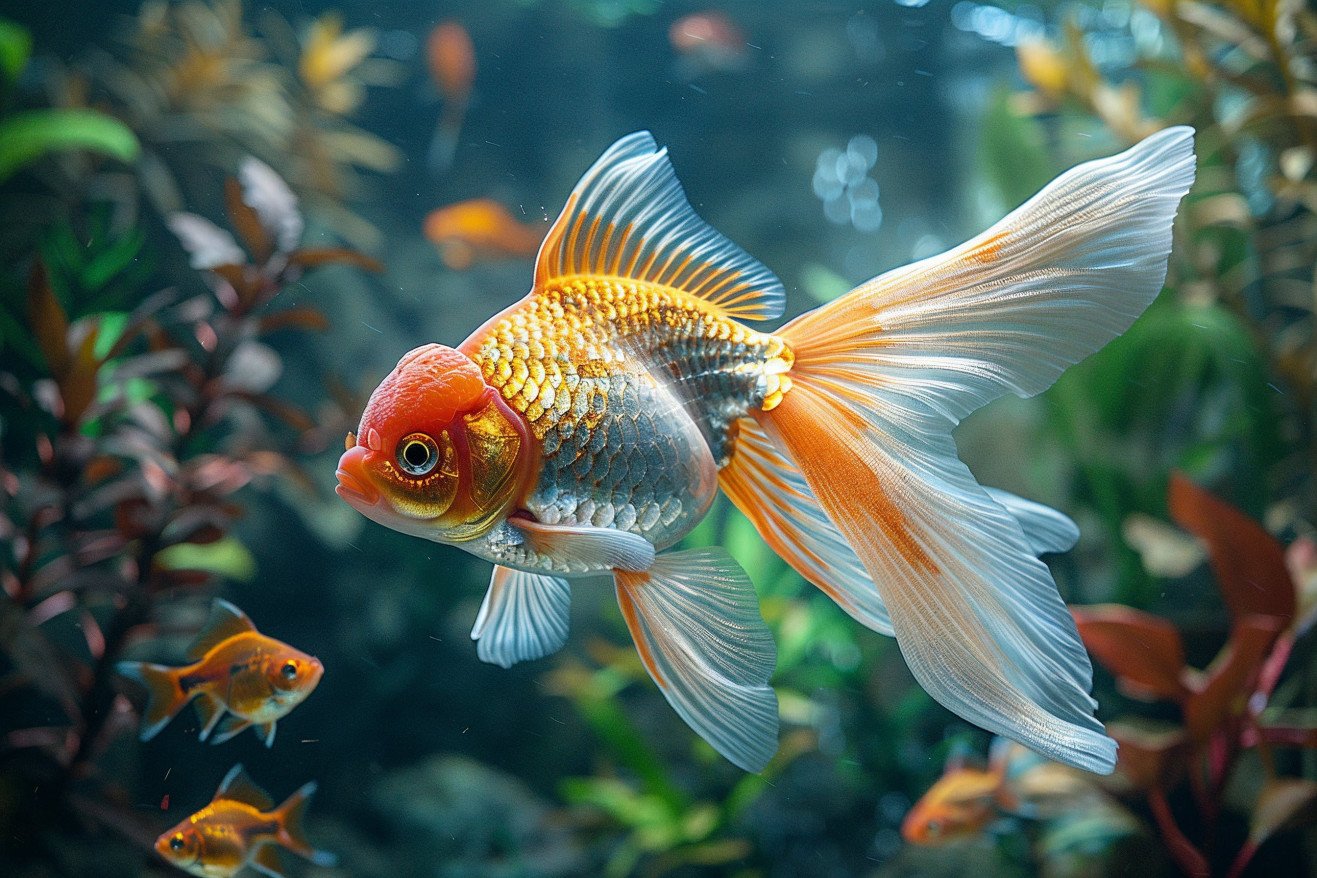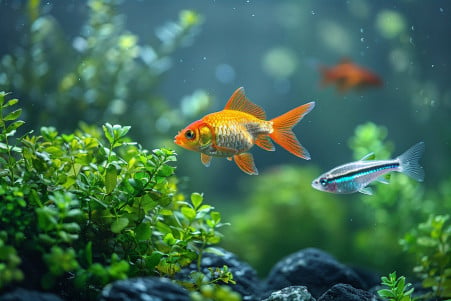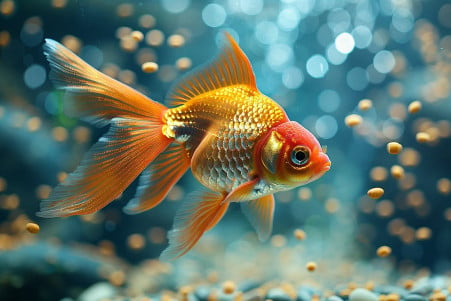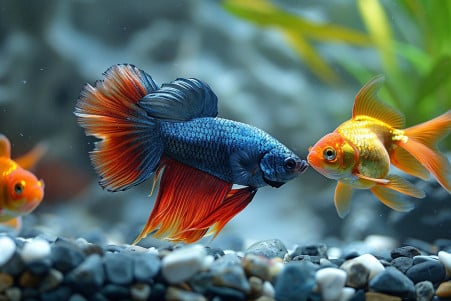Can Goldfish Eat Other Fish? A Look at Predatory Behaviors
18 May 2024 • Updated 17 May 2024

If you've ever tried to keep goldfish in a community tank, you may have learned the hard way that goldfish can and will eat other fish. Goldfish are omnivores, so they eat both plant material and fish food, but they are also opportunistic feeders that will eat other small fish, eggs, and fry - and they have a seemingly endless appetite for it.
In this article, we'll explore the feeding behaviors of goldfish and then get into some of the scientific research on what goldfish prefer to eat, how their digestive systems work, and what environmental factors can lead to predatory behavior. This information is important for anyone who wants to keep goldfish and other fish in a community tank.
Can Goldfish Eat Other Fish?
Goldfish Digestion and Diet
Goldfish have a special digestive system that allows them to eat a wide range of foods. Unlike many other fish, goldfish don’t have a stomach and instead digest food as it moves through their intestines, WebMD explains. They have pharyngeal teeth - hard plates in the back of their throats - that they use to chew their food before swallowing, according to the International Aquarium Fish Encyclopedia (INJAF).
Goldfish are opportunistic eaters and are good at sorting through the items they eat to find the ones they can actually consume, spitting out what they can’t eat, INJAF says. However, their digestive systems can be a little finicky - fancy goldfish with their rounder bodies often have more digestive problems than the longer, torpedo-shaped singletails.
Regardless of their body shape, goldfish are constant grazers. They are always feeding, constantly foraging for food in their environment such as bits of plants, insects, or detritus, INJAF explains. This constant feeding and willingness to eat anything that fits in their mouths is one of the reasons goldfish are so likely to eat other fish or fish eggs if they can catch them, and it’s one of the environmental factors that can lead to predatory behavior.
Environmental Factors That Lead to Goldfish Predation
Overcrowding and limited space can lead to stress and aggressive feeding behaviors in goldfish, according to Next Day Koi. Meanwhile, inadequate nutrition or starvation can lead to goldfish seeing other fish as prey, according to a Tropical Fish Forums discussion. Finally, poor water quality and less-than-ideal environmental conditions can lead to increased territoriality and predation in goldfish.
Even the way the tank is set up can lead to goldfish seeing other fish as threats. Advanced Aquarium Concepts notes that a lack of hiding places or line-of-sight breaks in the tank can lead to this problem. In addition, mixing species that are incompatible based on adult size, temperament, and swimming abilities can lead to predatory behavior in goldfish, according to the Aqueon article.
By being aware of these environmental factors and making sure to house goldfish properly and choose compatible tank mates, goldfish owners can help ensure their fish don’t turn on their tankmates. The next section will cover some of the best species to consider when creating a successful goldfish community.
Best Tank Mates for Goldfish Communities
Larger, more active fish such as zebra danios, rosy barbs, and white cloud minnows are all good options to keep with goldfish, according to the Aqueon article. Bottom-dwelling fish like dojo loaches, corydoras catfish, and bristlenose plecos are also good options because they stay toward the bottom of the tank.
The Tropical Aquariums SA article suggests that schooling fish should be kept in groups of at least six for their own safety. That said, it's important to stay away from slow-moving or small fish that goldfish may see as prey. In addition, as the Advanced Aquarium Concepts article explains, territorial aggression can be minimized by making sure that there is plenty of swimming space, hiding spaces, and line-of-sight breaks. If you set up the tank properly and choose the right fish, goldfish can be kept in a community tank.
How to Keep Goldfish From Eating Their Babies
Goldfish do not exhibit any parental care and will eat their eggs and fry if given the chance, according to the Fish Vet. To avoid this, it is important to move fertilized goldfish eggs to a separate hatching tank that has the right water parameters, as explained in the Goldfish Gazette.
After the fry have hatched, they need to be fed a special diet of small live foods and have their water changed frequently, as described in the wikiHow guide. Culling fry that are deformed or grow more slowly can help ensure that the healthiest fry get the food and space they need to grow, according to the Fish Vet. The fry should be moved to larger tanks as they grow to prevent them from eating one another, according to the Goldfish Keepers site.
If all of these steps are followed, from hatching to raising the fry, breeders can ensure that the maximum number of fry survive and are set up for success as they grow into the next generation of these colorful aquarium fish.
How to Breed Goldfish Successfully
The best age for goldfish to breed is between 2-4 years old because that's when they will produce the best quality eggs and fry, according to the Fish Vet. To stimulate the fish to breed, it's important to mimic the seasonal changes in temperature and light that occur in their natural habitat, as explained in the About Goldfish article.
When choosing broodstock, it's important to pick fish that have good genetics and the traits you want to see in the fry to ensure that they will grow up healthy and strong, according to Luke's Goldies. To make sure that the fish aren't stressed during the breeding process, it's important to make sure that they have enough space, clean water, and the right food, according to the Fish Vet.
That said, it's important to note that many of the fry will die, and only about 30% will survive to adulthood, according to the wikiHow guide. Still, by following these tips, breeders can increase the likelihood that they will be able to successfully raise the next generation of goldfish.
Conclusion: Responsible Goldfish Keeping
Goldfish have the potential to eat other fish, eggs, and fry if not properly housed and fed. Understanding their digestive system, environmental triggers, and compatibility needs is key. Proper tank setup, compatible tank mates, and meeting dietary needs reduce predation risks.
Dedicated breeding tanks and specialized fry care are essential for successful goldfish breeding. With the right knowledge and precautions, goldfish can thrive in community tanks.


